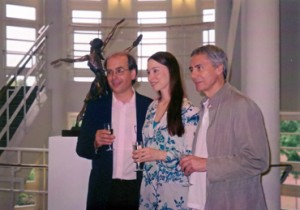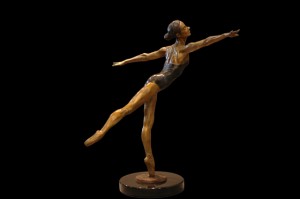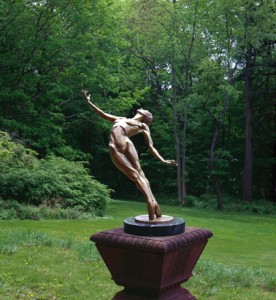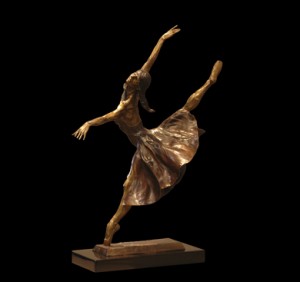Fans of Jacob’s Pillow will be pleased to see that we have JR Glover with us today on “10 Questions With…” read and enjoy!
1. How did you become involved with dance?
I insisted I wanted to dance as early as 3 years old; much to my parents bewilderment. We lived in rural southside Virginia where towns rarely offered dance, and some years there were no dance classes available within a 30-mile radius. When I begin elementary school the whole sit-in-your-seat/walk-in-a-straight-line situation seemed odd to me. I wasn’t particularly interested in the subjects being presented. My dad’s response to my mother’s concern about this was, “support her in what she wants to do and it’ll work out.”
Despite not knowing where hauling me all over the county would lead, my mother made sure I was involved in dance as much as possible; some years this included driving to 3 different towns weekly. When I decided to major in dance at college, my parents were nervous yet also very supportive of me as a person. I can still vividly hear my dad’s incredulous and happy exclamation when I phoned him from Texas to say that I had a full-time job, with benefits, teaching dance.
2. How did you wind up at Jacob’s Pillow?

After 10 years of teaching dance and dancing with a fabulous company in Texas, I wanted a broader prospective on the field and entered the dance graduate program at American University in Washington, DC. I also enrolled in the Arts Management Program which had an internship requirement. I was a Jacob’s Pillow intern in 1988, rather older than my fellow interns who tended to be mostly juniors and seniors in college. That internship remains one of my top 5 life-changing experiences and totally put me on the path of arts management. When the Pillow phoned in 1993 about a full-time position, I was ready to move to Massachusetts and work in a place devoted to my own passion.
3. What is your current role there?
I am Director of Education, which includes overseeing a series of professional advancement programs in The School, a year-round Intern Program, and a number of Community Programs for the public to experience dance and dance-making during the Festival on site and during the academic year in our area public schools.
4. What is it about your job that you love the most?
I frequently say that I’m a matchmaker and casting director. I love putting people or organizations together that either didn’t know about one another before or likely would not have found one another without my involvement. I love working with artists and dancers! Designing and overseeing programs that are meaningful and truly helpful to their desires and goals, at all points along their career paths, is rewarding.
5. What is the most challenging aspect of your job?
One challenge is the quantity of work required for the number of different programs the Pillow offers given our small staff and budget. Procedures and resources are constantly changing, shifting, disappearing, or re-configuring themselves while funding, staffing, and time remain extremely limited. Another challenge, though far more fun, is maintaining tabs on the many different worlds of dance – ballet, contemporary, jazz/musical theatre, African, flamenco, hip-hop, Indian, tap, and other cultural forms – in order to create programs that serve different populations within these worlds each and every year.
6. Can you talk a bit about what makes Jacob’s Pillow so unique?
How long is this article?! I could talk a long, long time about this. Many factors converge to create a place and atmosphere where dance can be created, learned, researched, performed, observed, appreciated, and experienced. The energy and creativity here is immediately felt on the exquisitely beautiful and peaceful grounds. Artists from around the world are working one building away from each other or collaborating on new projects.
The School convenes a small group of dancers, each recommended by an artist or hand-selected from auditions, to learn what is expected of them as working artists from the field’s leading teachers and choreographers. How deep you plunge into the intellectual, physical, emotional and spiritual world of dance is up to you at the Pillow, but you will be moved in a delightful way. The Pillow is empowering, transformative, restorative, edgy, compassionate, and passionate. Students and interns always say, “It’s life changing.” Audiences and the public say, “Wow, I never thought about that; this is amazing!”
7. As Director of Education you must see some pretty interesting things happening with dance education. Can you share one or two that stand out?

The number of dance programs available to dancers now, whether during the academic year or for summer study, is impressive. High quality training and experiences to work directly with full-time choreographers and artistic directors is more widespread, starting with very young dancers and continuing into higher education. It is much more acceptable, and even encouraged, for dancers to study multiple dance forms and art disciplines, as well as to use dance and choreographic skills to assist communities with non-dance goals. Young dancers are taking on more program responsibility and leadership, and producing their own work. The cumulative impact of all this on the field is rather exhilarating.
I hope this next generation will be strong advocates for the specific and unique attributes that only dance can bring to the table and that they can deepen acceptance of dance, outside of the dance industry, as a powerful and transformative way to think, imagine, create, and implement ideas.
8. Can you talk a little about the Intern Program there?
Pillow interns are integral and vital members of our staff. We hand over jobs and responsibilities to them that are absolutely essential to run our programs effectively and productively. They assist artists, faculty, scholars, press visitors, funders, students, and audiences. We offer training, supervision, and motivation so that their experiences and projects are successful. We have 33 interns from all over the world living and working with us during the Festival.
From September to May we have a much smaller group assisting us in preparing for the upcoming Festival. Some are career-changers, commuters, off-site interns, work/study or graduate/doctoral thesis candidates. Most are juniors and seniors in colleges and universities who live on our campus during their internship. All are able to get very close to the people and infrastructures that make the presentation, education, preservation, and creative development of dance possible.
9. What is The School itself like?
Physically it is located at the Pillow, with a beautiful garden and green lawn outside its studio door. Inside, it’s all wood, with a grand piano in one corner and space for the public to observe in another. Classes run six-days a week, with Master Classes led by Festival artists on the seventh day. Morning sessions focus on various dance techniques and afternoons are spent in rehearsal with exceptional choreographers who create work on the dancers. Every Saturday, the dancers perform for Pillow audiences on the outdoor stage and Mondays feature audition, music, or other career-building seminars. We prepare them as deeply as possible to work successfully in a professional company.
The faculty are artists from around the world who work as artistic directors, choreographers, directors, and master teachers. The international student body comprises an equal number of men and women; many are apprentices with companies or auditioning for company work. It’s a remarkable environment and opportunity!
10. What is next for you?
Planning for The School’s 2011 programs and auditions is well underway. Artists are agreeing to be on faculty, recommending dancers to study here, and proposing new programs for the future. There are residencies in our area schools where students are choreographing work about academic topics and teachers are being coached in kinesthetic teaching strategies for the classroom. Intern recruitment for the Festival is about to begin in full force since the priority deadline is in February. I’m fully immersed in planning and preparing for our exciting and meaningful 2011 programs!
BIO:
BIO: “J.R.” Glover is Director of Education at Jacob’s Pillow Dance Festival. Initially an intern in arts administration at the Pillow, she returned as staff in 1993 and since 1997 has served as Director of Education, overseeing The School, The Intern Program, and year-round Community Dance Programs. Prior to stepping onto the Pillow grounds, she performed with the cross-cultural contemporary dance company directed by Myrna Renaud in Texas and developed dance programs in magnet schools, alternative schools, dance studios, and community centers in North Carolina, Texas, Virginia, and Washington, D.C. In D.C., she was adjunct professor of dance at American University and the volunteer program director for the Smithsonian Institution’s Festival of American Folklife and its programming for the ’93 Inaugural Celebration on the Mall. She holds a M.A. in Dance from American University, a B.S. in Dance Education from the University of North Carolina-Greensboro, and a certificate in Arts Management from American University. She is a member of the International Association of Blacks in Dance, Massachusetts Alliance for Arts Education, and the National Dance Education Organization. She has been an evaluator for the National Evaluation Systems Educator Licensure Tests in dance education, a panelist for the National Foundation for Advancement in the Arts, an adjudicator for Prince George’s Arts and Cultural Heritage Division Choreographer Showcase, an advisor/board member to Pepatián, Sonia Dawkins/Segue, Circle of World Arts, and is on the steering committee for the African American Cultural and Heritage Celebration in Pittsfield, MA. As an arts educator, director, or colleague in the field, she strives to assist dance artists in realizing their goals and desires, wherever they are in the spectrum of their careers.









